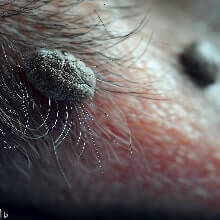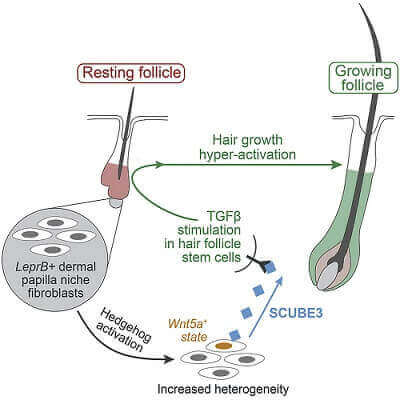Among newer companies involved in trying to cure hair loss, Amplifica (US) is particularly interesting. It was co-founded in 2020 by Dr. Maksim Plikus and Dr. William Rassman, both of whom I have covered before. The company’s two main areas of product development involve hairy mole related protein osteopontin and the SCUBE3 signaling molecule.
Update: July 12, 2023
An interesting take in wired on this same hairy mole (aka nevi) and hair growth research. They connect it to the well known phenomenon of dormant senescent cells and aging.
Update: June 28, 2023
Amplifica Begins Clinical Trials for AMP-303
Amplifica just announced that it started clinical trials for its lead candidate AMP-303. The first human subject was given a dose on June 27, 2023 and the study will finish in the first quarter of 2024. According to CEO Frank Fazio:
“Aside from assessing AMP-303 in subjects with androgenetic alopecia, this study will serve as a strong foundation for subsequent clinical studies with Amplifica’s pipeline compounds.”
We already know at least three compounds or molecules that they will likely test in clinical trials (with more to come):
- Osteopontin = AMP-203 per the DermWire interview I linked to previously.
- SCUBE3 = AMP-601 per my January 2023 update.
- CD44 = AMP-303? Not clarified in this latest press release.
Update: June 21, 2023
Amplifica Osteopontin (Hairy Mole Molecule) Clinical Trials Beginning Soon

I previously (see bottom of this post) covered Amplifica and its hairy mole research. The company’s founder Dr. Plikus and his research team discovered that a molecule called osteopontin is primarily what makes hairy moles grow hair.
Morover, this molecule can induce hair follicle growth when administered anywhere on the skin. The initial work was on mice, but the company plans to begin human clinical trials later this Summer per the latest update from today in Insider magazine. Dr. Plikus believes that this compound:
“Could be needled into the scalp of balding men and women to reawaken hair follicles that have gone dormant, in a near-painless Botox-like procedure.”
The treatment and trials will likely involve a combination of osteopontin and some other, newly-discovered hair-growing proteins that Plikus and his team have found. The Insider article implies that the other molecule will be SCUBE3 (already tested via microinjections in mice).
The team’s latest findings in relation to hairy moles and osteopontin were published in Nature magazine: Signalling by senescent melanocytes hyperactivates hair growth. A summary from today is also available on the company’s website.
The study describes the essential role that the osteopontin and CD44 molecules play in activating hair growth inside hairy skin nevi. In addition to these two molecules, the team thinks it is likely that their continued research will identify additional potent hair growth activators. Make sure to read the UC Irvine report of these findings.
Interestingly, Dr. Plikus says that this Nature publication is the result of nearly 10 years of research by an international team of scientists. The most encouraging quote of all from Dr. Plikus:
“It will grow like you remember it when you were 18. It would not grow like thickened, wiry armpit hair. This burst of molecules is shown to hair follicles on a scalp, and they’re like, ‘Oh, OK. Time to grow!'”
Update: In an interview with DermWire, Dr. Plikus says that the osteopontin-based compound highlighted in the Nature publication is designated as AMP-203 at Amplifica.
A Note on Osteopontin and Hair Growth
Note that I previously covered osteopontin in a number of my posts on Follicum, a company which disbanded in 2021 but came back in 2023 under new ownership. Their use of an osteopontin based peptide was slightly different from what Amplifica will be doing via osteopontin (plus other molecule) injections.
Follicum’s Phase 2 clnical trials resulted in a hair growth increase of 6.6 hairs/cm2, which was deemed insufficient to continue with Phase 3 trials at the time. Hopefully, the company’s new owners will have a change of heart.
Update: March 27, 2023
An interesting new UCI article covering the work of their hair scientists Maksim Plikus and Natasha Mesinkovska. Per Dr. Plikus:
“Most likely, SCUBE3 would be microinjected less than a millimeter beneath a person’s skin, a “fairly painless” process that would have to be repeated periodically to maintain hair growth”.
Human trials on Amplifica’s lead compound (likely not SCUBE3, which was my original assumption) are expected to begin later in 2023.
New Agreements with Ingenza and University of California
January 26, 2023 — Amplifica signed an exclusive licensing agreement with “The Regents of the University of California” for a proprietary pipeline hair growth molecule (SCUBE 3) that has been in the news a lot lately. Key quote:
“This early-stage compound (SCUBE3) will now be referenced as AMP-601 and is currently undergoing pre-clinical testing at Amplifica.”
January 20, 2023 — Amplifica to collaborate with UK-based Ingenza in order to advance novel alopecia treatments involving the former’s signaling molecules and proteins.
November 14, 2022 — Make sure to watch the below interesting recent video presentation by Dr. Plikus:
October 24, 2022
Amplifica
I previously mentioned new hair loss company Amplica in my post about Dr. Maksim Plikus’s research on the Scube3 molecule for hair growth. He partnered with Dr. William Rassman to create Amplifica. The latter announced his involvement via a Reddit comment in July 2022.

Earlier today, it was announced that Amplifica just completed a $11.8 million Series A Financing round. These funds will enable clinical development of the company’s lead products to treat androgenic alopecia.
These lead products are listed as “AMP-303” and “AMP-506”. The press release states that they expect to initiate first clinical trials in fiscal year 2023.

Amplifica, Dr. Maksim Plikus and Hairy Moles
Note that Amplifica was first mentioned in a 2020 news article in regards to the new company’s interesting work in relation to hairy moles. At the time, a team led by Dr. Plikus discovered that molecules from moles that grow excessive hair can induce follicle growth when administered anywhere on the skin.
Make sure to also read my past posts on Dr. Plikus and his many areas of hair loss research breakthroughs. His team is based at the University of California, Irvine (UCI).
Amplifica is yet another new company added to my main page on hair loss research around the world.
